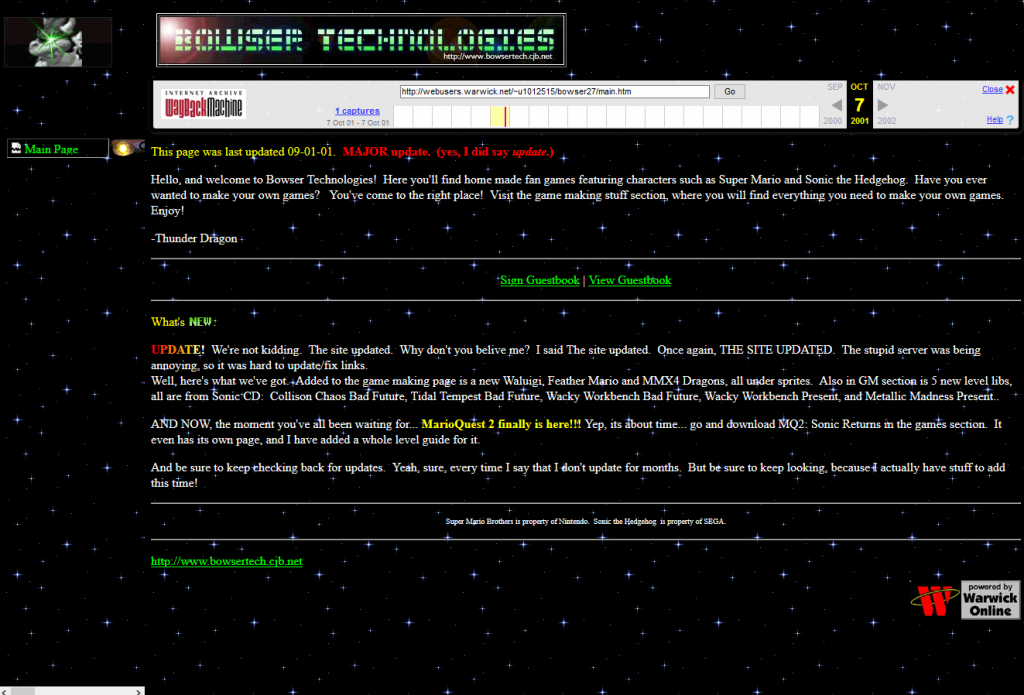It’s interview time again on Gaming Reinvented! Yeah, it’s happening already. Bet you didn’t expect that so soon after Guru Larry’s interview did you?
Nah, nor did we. But the Eyes in Everything team had their answers ready a tad ahead of schedule, so we decided to hurry up the interview and get it posted as a result.
But hang on, what is Eyes in Everything?
Well, basically it’s the dev team behind a game called Psycutlery.
Which in turn is basically a spiritual successor to a beloved Mario fan game called Psycho Waluigi. Complete with Psycho Waluigi developer Thunder Dragon as the main dev.
Either way, here’s a trailer for Psycutlery, in case you don’t already know of it:

But hey, enough waffling for a minute! Let’s get on with the interview!
1. So let’s start with a simple company question. How did you guys meet for the first time? What made you want to set up Eyes in Everything?
LUKE: The two of us go back since, well, practically forever! Nearly 17 years is practically forever in internet years, uh, right? It was the year 2000 when I made public a little fangame site called “Bowser Technologies,” which soon led to our meeting.
As far as setting up Eyes in Everything goes, it was not formed as a team initially. I came up with the label as a sort of brand identity for myself. The label was to be applied to all my creative endeavors, from art to game development. Likewise, the game Psycutlery was meant to be a solo project. I could have easily done everything myself… except for two crucial elements: the music, and the marketing. I wasn’t nearly experienced enough in either field to pass a professional-grade project, so to speak.
Jon found me at a great time. He is a passionate musician, and is now researching indie game marketing. Perfect!
JON: Way back in 2000, I was known as Yoshiman. I had only made possibly 4 or 5 posts on the not-so-active forum until he switched it up to MFGG. At that time, I was just a lowly member while he was the big guy, top-notch administrator. Down the road, I worked on up to administrator, which I think helped acknowledge a more equal-level friendship than before. Eventually, I offered to make some songs for Psycho Waluigi, and then afterwards left the website for some time. I got wind on Twitter that he had finally broke away from creating fangames and begun an indie game. I wanted to create the whole soundtrack for Toadette Strikes Back (I still have two songs I was working on for it) before I left, so I felt it was my personal duty to offer it now for Psycutlery.
2. And hey, how about the name? Where did that come from?
![]()
LUKE: I fretted long and hard coming up with a brand label, and sketching out logos for many potential brand identities. Whatever I did, I just couldn’t come up with a decent name! When I looked back at some of the logos I scribbled out, I noticed one common trend amongst the lot of them: eyeballs. And then I looked back at some of my other random drawings. Eyes everywhere, and in everything! That was when it dawned on me. Eyes in Everything! It also carries something of a double meaning about finding eye-opening inspiration in, well, everything, which is a philosophy we seek to carry across our work.
3. Were you planning on making any other games before Psycutlery? Or is this your first ever idea for a game?
LUKE: I actually didn’t really have an “idea” to make Psycutlery. It was something that just… sort of happened! It began as an open-ended experiment that, by some series of contrived coincidences, ended up becoming something of an actual game. But to answer your question, since I don’t consider Psycutlery an idea so much as happenstance, yes, I did have other ideas for games. Two, to be precise: an underwater action-adventure, and an action-RPG platformer hybrid involving ghosts and necromancy. But considering both of those are considerably more complex ideas, it’s probably better to start off with a simple platformer, huh?
4. As we know, one of your team previously made a Mario fan game called Psycho Waluigi. So, how much did that inspire Psycutlery as a game? Because it definitely seems to have some similarities to the fan project…

JON: It was pretty much all Luke that made Psycho Waluigi, with some testing help, a few other’s sprites here and there, and MIDI to MP3 music for the songs not created by me. We’ve said on Twitter and many other places that Psycutlery is the spiritual successor to Psycho Waluigi, so it has many similarities.
LUKE: Originally, it had nothing to do with Psycho Waluigi. But remember how I said that Psycutlery was a thing that kind of just… happened? In its experimental stages, it was something of a straight-up Yoshi clone, albeit with original characters. However, having decided around the time that I wanted to distance myself from fangames forever, I didn’t want a character with an extendable tongue. So in a haste, I covered up all ties to Yoshi with a spork. A floating spork. That happened to be controlled with what appeared to be psychic powers. So, ironically, in my urge to distance myself from fangames, the project wound up playing awfully similar to one! Thankfully, it was one of the few fangames that had potential to pass as something original with a few audible and graphical swaps – so, hey, may as well act on that.
5. Why Psycutlery? Seems like a very weird name for a game about a character with psychic powers…
LUKE: But did you notice exactly what the character was controlling with said psychic powers? It’s a piece of cutlery, is it not? As for the pronunciation, think of it as something like “psychiatry” or “psychology,” only with tableware.
6. Heck, what’s with the kitchen utensil motifs anyway? Because everything from the logo to the end of level goals seem to involve forks…
LUKE: It’s a SPORK. It’s like a fork. But it’s also like spoon. It’s the jack-of-all-trades, master-of-none in the world of silverware! As such, sporks are inherently comical, so the idea of a game that places emphasis on one is bound to raise a few laughs. It’s all to set the decidedly bizarre tone of the game, and the wonderful absurdity of saving the galaxy with such an impractical eating utensil… there’s something of an underdog story there.
7. What about the graphics style? To me, it reminds me of a fair few GBA games (in a good way). Was that the generation you were inspired by?
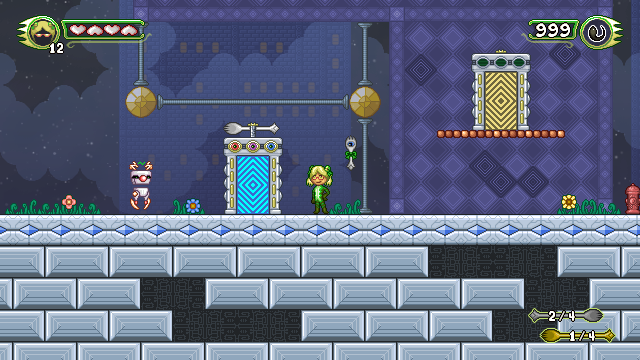
JON: The Progressive Era – the first spork to be manufactured was available in 1890. Huge inspiration.
LUKE: Indeed! Actually, the original patent for the implement that would become known as the spork – Dr. Samuel W. Francis’s “runcible spoon” – was issued as far back as 1874. So one could say this is a graphical style over 140 years in the making!
Ehhhh, but seriously, there was no specific console generation that inspired the graphics. I was merely going for what one would call “simple pixel art,” for the sake of convenience and ease of animation. See, I have long been a traditional illustrator, so everything in both the digital realm and the realm of animation is something of a new experience to me (although I have previously dabbled lightly in both). One of the coolest things about game development is learning all sorts of new things, really! Like, you know, the history of the spork. Wild.
8. And what’s the goal behind the game’s soundtrack? Any particular feel you’re going for here?
JON: Oh hey, a good question for me! The soundtrack has to compliment not only the general feel of the game, but what’s going on with the screen at the moment. So the general feel of the game is space, quite vaguely. The other general elements are the spork and psionic powers. So each song has to incorporate each of those elements, while still applying to what’s happening visually and accompany what the song is used for.
So for example, the track playing for the “HUB” is ambient and odd – indicative of space exploration. Then you enter a level (just a test one in the demo), and the music is now more clear and focused – indicative of platforming and more focused gameplay. All the while, there still remains those three elements.
In the test demo, I feel, along with Luke’s songs, we hit this partly, but I will still need to slam down and achieve this in a much more obvious way that feels like the soundtrack songs are closer together than far apart.
LUKE: Jon is the primary musician here at Eyes in Everything, although I am beginning to learn music composition myself these days. Some of the shorter songs are mine, like the aforementioned hub themes, for example. Game development is truly a journey across the arts.
9. So Lillian is the main character in this game, right? Where’s her design come from?
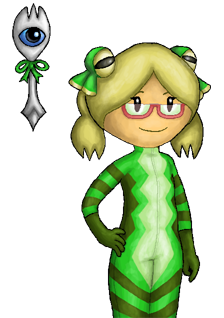
LUKE: A frog, basically. Remember how I said this began as a sort of Yoshi spoof? Well, she literally did have a long tongue at first, so the frog motif seemed most appropriate. Of course, the tongue was replaced with a spork for the sake of originality (and her pigtails were fashioned to resemble sporks soon afterwards), but I decided to keep the frog theme since, well, frogs jump high. The name Lillian serves as both a sort of frog pun (as in lily pads or water lilies), and it rhymes with “alien,” working into the whole space setting. The frog costume makes her look sort of like a space alien anyway, so there you go. Lillian the Alien.
JON: I think Lillian looks like Luke, personally.
10. How about the alien/space themes in general? It’s certainly an interesting mix seeing psychic powers alongside aliens and futuristic space stations and planets…
LUKE: I was always something of a space freak, and since Lillian looked vaguely alien, why not? The whole space bit came way before the psychic powers, but hey, space is limitless—you’re bound to run into such weirdness if you travel far enough! Once you get to spend time with the game, you’ll find out that the setting is more “science fantasy” than straight-up sci-fi, as the presence of a unicorn may perhaps allude to. In any case, I feel the futuristic theme compliments the slightly rectangular nature of pixel art, while still allowing for varied settings.
11. And what’s the plot here? Have you come up with a main villain? Their evil plan? Something Lillian is trying to find or save?
JON: Lillian is just super hungry, that’s all!
LUKE: Actually, yes. Painfully super hungry. I hope to deconstruct that notion somewhat, should the constraints of the medium allow for it! That is only the beginning, though: it all leads to a greater plot at hand, folding out as the player progresses. Expect twists and all sorts of colorful characters to meet.
12. What’s the deal with the enemies here? The ones I’ve seen have some very intriguing designs, so what’s the story behind these guys? Like the berry monsters in the test level?
LUKE: You mentioned the berries, so allow me to introduce you to the notion of the Goomba. That is, the one enemy (and its countless variants) that exists as the weakest of the weak on the ladder of evil minions. I felt like taking this notion to its extreme by introducing an enemy that floats around in one place doing literally nothing, just waiting to be eaten. To convey their roles, the monsters had to look like actual, tasty food, hammering the point home. There are other food monsters too, like the watermelon and ice cream; although not every monster is based off of food, since not every one of them is edible. Some of them were just doodled randomly!
13. Onto the psychic powers/Psycutlery thing now. What’s the story behind this? Aka, the floating eye spoon thing behind the main character?
LUKE: Lillian the Alien originally had a Yoshi tongue, and again, I didn’t want her to have a Yoshi tongue. But since the tongue and the eating mechanic was already there, all I could do was cover it up. Make the tongue invisible, and stick a spork over the tip. And lo, what do you know, it looked like she was controlling that spork with her mind now! As for the eyeball… well, see our brand name!
14. There are quite a few interesting breath powers in this game too, like the ones that let you shoot fire, an electric shield, bubbles or spike balls. Where did this concept come from? And heck, are there lots more interesting ones not shown in the test level?
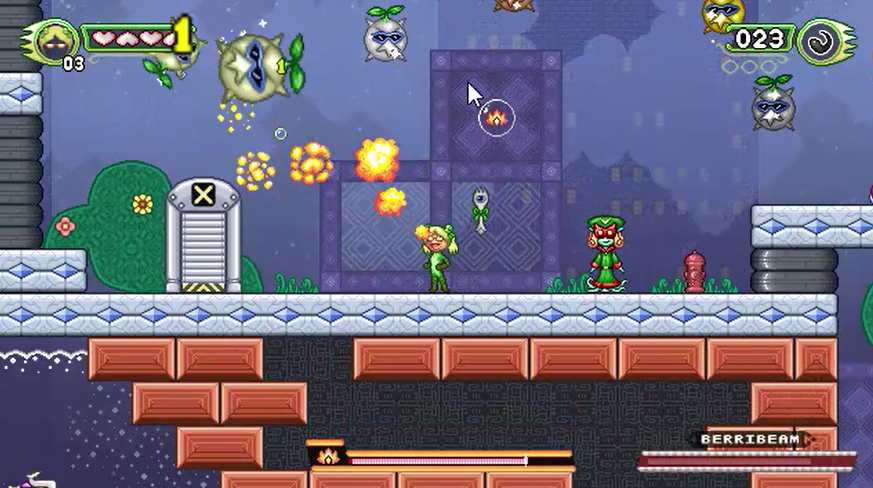
LUKE: It’s always nice to have a bunch of little power-ups to keep things varied. There will be many more previously unseen breath powers to come, and there will probably be entire levels focused on using specific powers to progress.
15. And the old Unicorn thing. Was that inspired a little by Yoshi from the Mario series, or the Animal Buddies from Donkey Kong or Kirby? Because it reminds me a bit of them.

LUKE: Since Lillian was essentially Yoshi at first, I thought it would be hilarious to have Yoshi riding a Yoshi.
16. Another interesting difference here are some of the small control/physics differences from more traditional platformers. Like being able to sort of infinite jump in the air, entering doors by pressing down rather than up, not falling off the unicorn when hit, again. Were these types of things added to be a bit more unique?
LUKE: The air jumps also have their roots in Yoshi’s island, being inspired by the flutter kick maneuver – I feel this could create some interesting platform challenges. You can enter doors by pressing up, provided you don’t have the up button set to jump, so the down button was added for practicality in such control schemes. You don’t fall off Darkles the Disgruntled Unicorn when hit because he was designed more as a stage gimmick than as a power-up. Again, something to change up the gameplay a little every now and then.
17. A few questions about the game’s releases and format now. So, what platforms is this game going to be released on anyway?
LUKE: We’ll probably distribute it through Steam somewhere down the line, although other distribution platforms might be worth looking into.
18. Are there any plans to maybe bring it to consoles, like the Nintendo Switch or PlayStation 4 or Xbox One?
LUKE: I would LOVE for this to be released on Nintendo consoles, and that is something I would like to actively pursue after the PC release. Granted, it could be difficult since the project is being created in Clickteam Fusion, whose porting options are very limited. Certainly not impossible, though! It all lies in working with the right people, really. I think this sort of game is something that would resonate with the Nintendo audience, especially with me being a major Nintendo fan myself. If we can get this on the Switch or something, then PlayStation and Xbox might be worth looking into as well, possibly. I definitely want it on Nintendo, though.
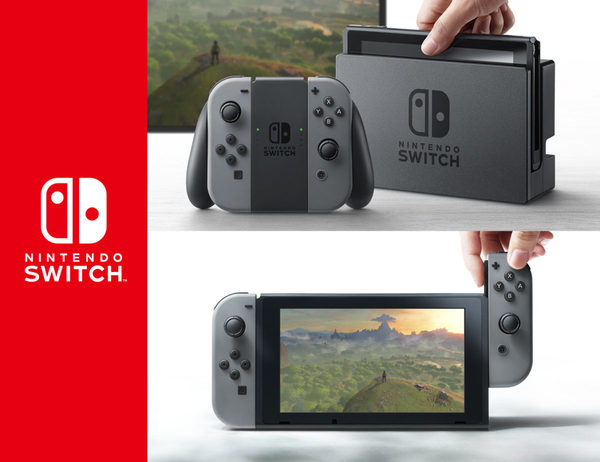
19. How about a retail release? Or is this going to be digital download only?
LUKE: Hahahahaha. As cool as that would be, that would be a significant investment of resources, especially for just two people running such an informal operation. Even the major indie titles who receive physical releases seem to enjoy only limited runs, although they are slowly beginning to become more common in this day and age. But yeah, highly improbable at this stage, but who knows what the future holds?
20. Any plans for other computer formats? Like say, Mac or Linux PCs?
LUKE: I’ve only ever had Windows PCs, and have yet to experience the need to migrate. Therefore, what that all depends upon is whether there is sufficient demand or not, and if there is anybody out there willing to help with the porting.
21. Unfortunately, it seems not many people know of this game’s existence at the moment, at least outside of Mario Fan Games Galaxy and your Twitter followers. Do you have any plans to get the mainstream media talking about it? Or the game discussed a bit more on sites like Reddit?
JON: It’s a slow and steady plan in terms of getting more awareness. Before we released the test demo, there wasn’t too much interest. Now that it’s out, there has been a definite increase in its existence being known. I believe we will have a proper demo out in the future, and at that time, we will ramp up the awareness efforts. At this point of time, now with a test demo out, we’d like to get smaller websites and influential individuals to know about it, but it’s not something significant to write home about yet. It’s tricky, and sometimes we’ll have to change the pace of getting it known depending on everyone’s reactions.
22. How about crowdfunding? Have you ever considered a Kickstarter campaign for this game or something?
LUKE: We have discussed this, but the main point of contention is finding out what we’d actually need funding for. Neither of us want to grub money for the sake of it!
23. And if it catches on, are there plans for sequels to this title?
LUKE: Personally, I never plan for sequels. I want each game to be its own full experience, and I don’t want to hold any ideas back for any so-called “inevitable sequels.” I try to make each game as if it is my last. If there are to be any sequels, it wouldn’t be until several years after the first, after we have released other titles. Basically, the need for a sequel has to justify itself in some way.
Besides, we have barely even started on the first one, haha!
24. Finally, what would you say about this game that you hope will get a lot more potential players interested in buying it? What’s the hook that will sell this to the skeptical Steam user or what not?
LUKE: Pixel based indie platformers are a dime a dozen. However, one would be surprised at how few of the truly ambitious ones actually fit the mold of “traditional platformer.” The common trends there seem to be either Metroidvanias, puzzle-platformers, or die-a-lot-super-challenges. Those can be pretty great, but what if you want to play something more along the lines of, say, Yoshi’s Island or Donkey Kong Country?
There seems to be a general mentality amongst indies in regards to traditional platformers that goes as follows: one, it’s difficult to make “running and jumping” interesting; and two, nobody can do “running and jumping” better than Nintendo. There seems to be a general intimidation surrounding the whole matter, but hey, I say turn that intimidation into inspiration! I won’t go so far as to claim that we can reach Nintendo’s absurd level of quality, but dang it, I think we can come pretty darn close. This is not to boast; but rather, it’s to set a goal, disregarding all stigmas and preconceived notions. You won’t know until you try!
So, what are some of the “hooks” in Psycutlery, you may wonder?
- As far as pure platforming goes, I think the multiple air jumping mechanic has the potential to be pretty fun – I seriously question why more platformers don’t employ something similar.
- Each level will be different. Each with its own gimmick, look and feel. No two levels will be the same, and there will be a lot of them! And each one will have an unlockable, alternate version that changes the whole feel of the place even further (the test level contains an example of this – yes, that shadowy place is in fact the very same level), effectively doubling the level count.
- Customization. You can freely adjust your max health, making the game as easy or as hard as you need it to be. The control settings are ridiculously customizable, too. You can change all the buttons, and say, if you have trouble using the keys and mouse together and at the same time (which is how the default control scheme is supposed to work), you can easily select a different setting at any time, and tweak it until you find something you are comfortable with. Heck, you can even play it in 2-player co-op, with one person platforming, and the other attacking with the mouse.
- You control a spork with your mind. In space. If that doesn’t interest you, then you are at least interested in knowing what the heck the developer was thinking to have come up with that!
But all in all, we would like to show that traditional platformers can be interesting, varied, unique, and truly ambitious… without having been made by Nintendo. I seriously feel that any game developer – and I mean ANYONE – can do all that, with just a little bit of dedication. Reach for the stars and all that jazz!
JON: I believed from the start that the developer (Luke) has the innate ability to create a solid game. He’s been at this since he built the Bowser Tech/MFGG website, and it showed very well in his last 2 fangames he made. A lot of people said they wouldn’t have doubt it if Nintendo themselves made Psycho Waluigi, and that’s all because of how he’s able to persevere and shape these creations. I have no bloody clue how the heck Luke does it, but he’s able to make these well-polished games. He has a great portfolio, so to say, of successes in the past, and I firmly believe this is another one. Plus, you’re seizing a spork psionically in space. These alliterations write themselves! I don’t think you’ll find that anywhere else.
And wiser words have never been said. We definitely need more ‘traditional’ indie 2D platformers after all, and this looks like just the thing to fill the void. So let’s see if this can end up on par with Mario. Or inspire the sort of wonder that platformers from the 90s once did all over again.
For now though, that’s it. That’s the end of the interview. Thanks to Luke and Jon for agreeing to be interviewed, and we’d suggest you check out the official Eyes in Everything Twitter and official site if you want to see more.
